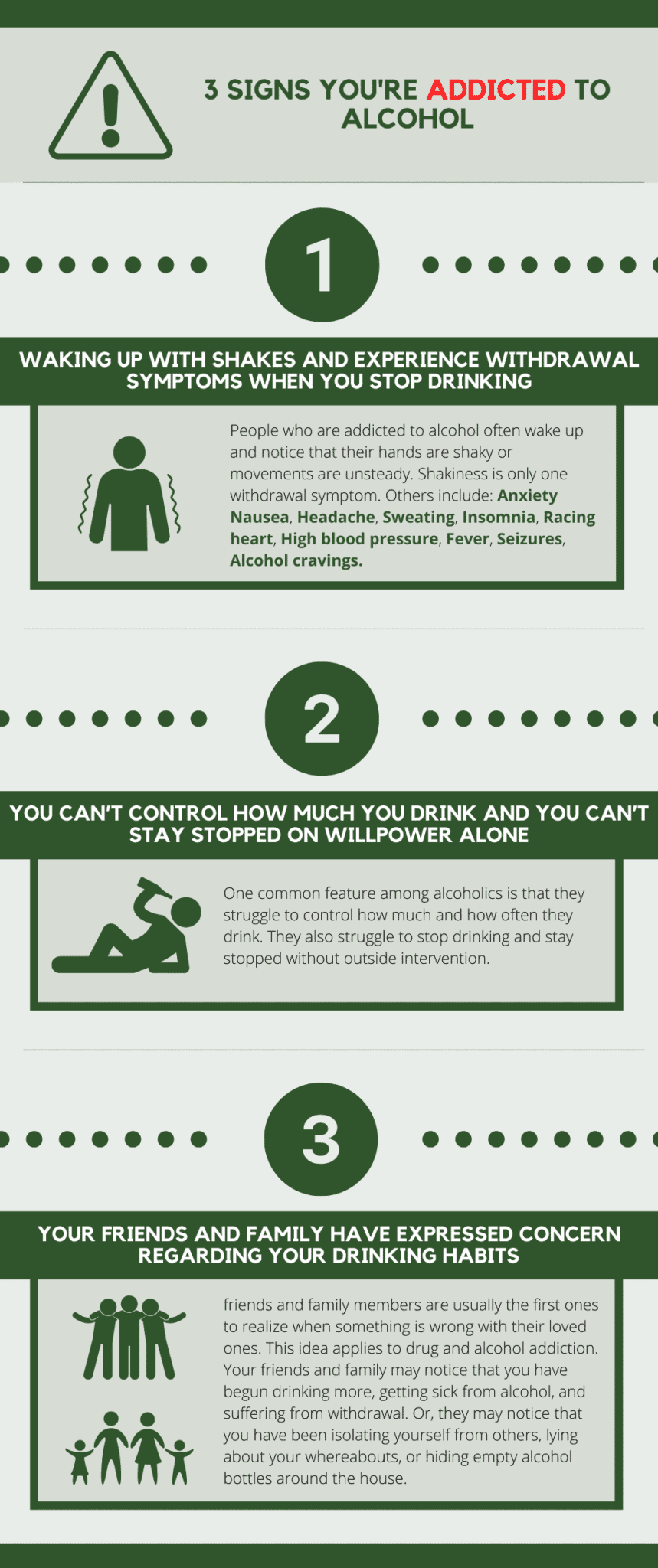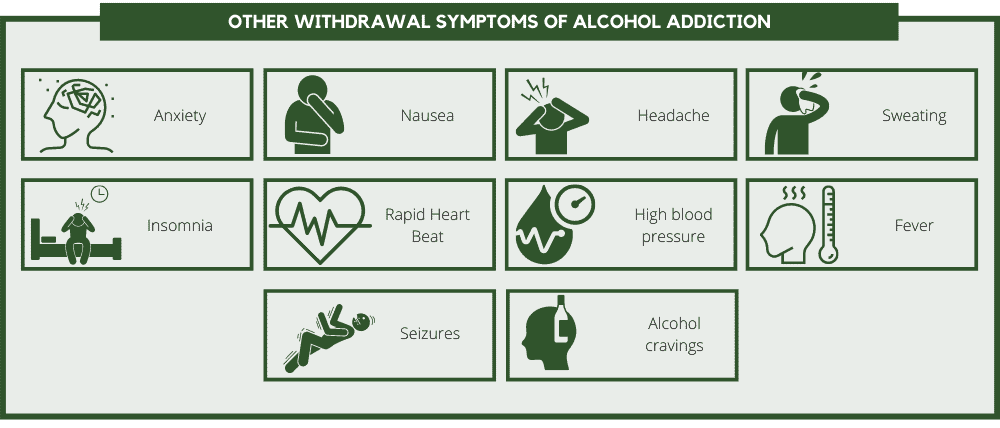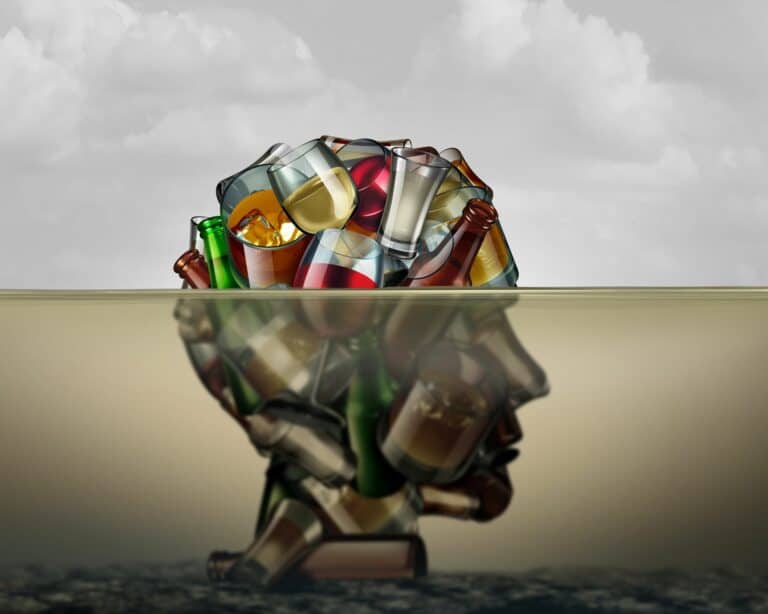According to the Centers for Disease Control (CDC), two-thirds of American adults aged 18 and older consume alcohol each year.[1] Alcohol is legal for anyone over the age of 21 to purchase and a socially acceptable substance in the United States. However, just because it is socially acceptable and popular doesn’t mean it isn’t addictive. But how do you know if your drinking has gotten out of control or if you need professional help? Here are 3 tell-tale signs you are addicted to alcohol and where you can go for help in the Boston area.
3 Signs You Are Addicted to Alcohol
Like any other health condition, people who suffer from alcohol addiction may display a variety of signs and symptoms that are apparent to themselves and other people. If you notice yourself relating to any of the following signs, you may be addicted to alcohol.

1. You Wake Up With the Shakes and Experience Withdrawal Symptoms When You Stop Drinking
Alcohol is a central nervous system (CNS) depressant that slows down bodily functions and produces feelings of relaxation and calm. However, once you are physically dependent on alcohol, your body experiences physical and mental symptoms of withdrawal. Withdrawal symptoms occur because, without alcohol, the CNS is overly excited.[2]
One tell-tale sign of alcohol withdrawal is a symptom that is referred to as “the shakes.” People who are addicted to alcohol often wake up and notice that their hands are shaky or movements are unsteady. Shakiness is only one withdrawal symptom. Others include:

- Anxiety
- Nausea
- Headache
- Sweating
- Insomnia
- Racing heart
- High blood pressure
- Fever
- Seizures
- Alcohol cravings
Alcohol withdrawal can be so uncomfortable that you are tempted to continue drinking so you feel OK.
2. You Can’t Control How Much You Drink and You Can’t Stay Stopped on Willpower Alone
One common feature among alcoholics is that they struggle to control how much and how often they drink. They also struggle to stop drinking and stay stopped without outside intervention. Have you ever gone for a night out with your friends and promised yourself you would only have one drink, only to end up having four, five, or six? Or, have you ever promised yourself you were going to stop but found that you were unable to do so? If so, you may be addicted to alcohol and in need of professional substance abuse treatment.

Get The Care You Need and Deserve
Woburn Addiction Treatment is a leader in the addiction treatment field, with proven success in facilitating long-term recovery. Our team of top clinical & medical experts specializes in treating addiction coupled with mental illness, ensuring that each person receives individualized care. Call us – we’re available 24/day, 7 days/week.
3. Your Friends and Family Have Expressed Concern Regarding Your Drinking Habits
Unfortunately, friends and family members are usually the first ones to realize when something is wrong with their loved ones. This idea applies to drug and alcohol addiction. Your friends and family may notice that you have begun drinking more, getting sick from alcohol, and suffering from withdrawal. Or, they may notice that you have been isolating yourself from others, lying about your whereabouts, or hiding empty alcohol bottles around the house. All of these are behavioral signs of alcohol addiction, and if your friends and family have expressed concern about them, it’s likely that they are right – you probably have a drinking problem.
Where Can You Get Help for Alcohol Addiction?
Alcoholism is a progressive and deadly condition that requires professional treatment. Few alcoholics get better and stay better without getting help. Fortunately, there are many options available to you, so you can speak with an admissions coordinator to figure out which one is best for you.
Detox and Residential Treatment
Detox is usually the first step in treating alcohol addiction. Alcohol withdrawal can be unpleasant and even life-threatening without medical help, but alcohol detox centers in Massachusetts can make the process easier. Detox is usually paired with residential treatment where you receive around-the-clock monitoring and support. These levels of care are best for people with severe addictions or co-occurring medical conditions.
Day Programs
Day treatment, also referred to as partial hospitalization or PHP, is similar to residential treatment except you are free to live in the comfort of your own home while attending treatment throughout the day. Like a full-time job, group and individual therapy sessions consume the majority of your time. You are only on your own for dinner, sleep, and breakfast. This level of care is appropriate for people who cannot commit to a residential program or those who do not need alcohol detox services.
Intensive Outpatient Programming (IOP)
IOP programs consist of several days of therapy each week but they are less intensive and time-consuming than PHP and residential. Alcohol IOP is best for those with mild addictions who are mentally and physically stable as well as sufficiently supported at home.
Find an Alcohol Rehab in The Boston, MA Area Today
If you think you are addicted to alcohol and find yourself exploring alcohol recovery near me, you’ve come to the right place. At our addiction treatment center, we offer addiction treatment programs and mental health treatment programs for a range of addiction types and mental health disorders by combining proven therapeutic methods of healing with evidence-based holistic treatment modalities. This makes for an integrated and highly individualized approach that isn’t found anywhere else in the Boston area. Whether your friends and family are worried about your well-being or you know in your heart you are ready to stop drinking, we can help. <a href="http://“>Contact us online or call (781) 622-9190 to speak with a dedicated admission coordinator to find the right alcohol rehab program for you.
References:


